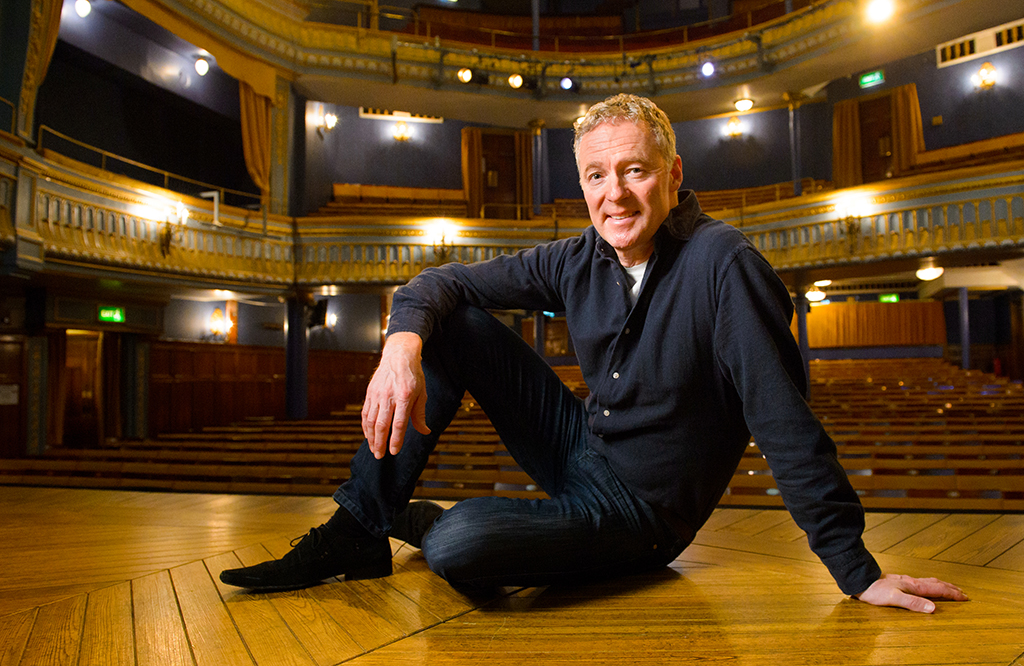
Why Rory Bremner has made a big impression
As befits someone who pretends to be other people for a living, Rory Bremner is conflicted about his identity.
‘I am not feeling very Scottish today,’ he declaims, brows arched. It turns out this is part of the problem.
‘I have just had my eyebrows threaded in preparation for a Noel Coward play, which opens on Wednesday. It’s hardly William Wallace.’
Bremner was born in Edinburgh in 1961, and currently resident in the Borders when Coward-based commitments allow.
Bremner has a stellar CV in political satire.
Speaking in 2014 before the independence referendum, he felt there was a serious agenda behind his compulsion to get a laugh.
‘We need to have humour in the debate. If I do impressions of Alex Salmond, people say “how dare you ridicule Alex Salmond, I voted for him, if you send up Alex Salmond you are insulting all the people who voted for him”. You just don’t get that with Cameron, Osborne or Nick Clegg; people accept jokes as part of the political process. It should be part of the political process in any country, that politicians are fair game for satire.
‘It’s not another thing of undermining politics, it engages people with the debate. A lot of people are switched off by the bitterness off it.’
Politics needs big personalities, as well as gags, to engage the non-manifesto reading classes. One reason is that politics has become increasingly managerial. ‘Most government functions are carried out by Capita, Circa or G4S. The whole of the economy was delegated to the City, it was only when the whole thing blew up that government came back in and took over.’
It’s not the satirist’s job, he says, to tell anyone how to vote. ‘I follow the referendum, I’m fascinated by it, I have my moments when I drink the Irn-Bru and think: we could be a Nordic social democracy. And that seems exciting. But I’m absolutely not in the business of telling people what side to come in. I want people to vote, but they must follow the arguments too.’
If this sounds like Bremner spends all his time weighing up the minutiae of the debate, nothing could be further from the truth. (He hasn’t even read the whole of Scotland’s Future, the 220-page official White Paper yet. Another of his great lines: the reason the SNP has made extra childcare a key commitment is so that every woman in Scotland has time to get through it.)
Instead, he has been spending a good deal of time with Noel Coward, rehearsing Relative Values. It is his first ever acting role, directed by Trevor Nunn, starring beside Caroline Quentin and Patricia Hodge. It started life on a minitour last year and, despite this talent-squelching line-up, the cast thought that a West End run was not happening. (‘Finding a West End slot is like finding a space in a supermarket car park. There’s one – oh no – Cameron Mackintosh has nipped in ahead of me.’)
Bremner and Coward, both masters of the aperçu, are a great match. ‘It’s a period sitcom,’ he says of the 1951 play, Coward’s meditation on the social upheaval that followed the Second World War. ‘It’s fascinating to be doing it at this time, when Downton Abbey is on TV and there is this extraordinarily nostalgic obsession for a world that is very different from ours, yet in some ways very similar.’

Scots impressionist and actor, Rory Bremner, in 2014 (Photo: Fiona Hanson)
Lines learned, spare time is devoted to translating an opera. Bremner has form here, having already reworked Carmen, Der Silbersee and Offenbach’s Orpheus (that was for Scottish Opera in 2011). He’s currently spending his free evenings with Kurt Weill’s The Seven Deadly Sins, written with Bertold Brecht in 1933.
‘I’m about six sins in,’ he says cheerily. ‘I’ve just finished Avarice and I’m moving onto Jealousy.’
Then there is charity: he’s an ambassador for Quarriers, fronting its Ryder Cup initiative to extend sports-style coaching to disadvantaged youngsters. (And watching some golf.)
Anything that takes him back to his home in the Borders is, he says, a bonus.
‘It’s the arc of life: having been born here, I’m gradually working my way back. As the years go by I’m happier when I’m spending time in Scotland.’ He is almost dreamy.
‘Jump on the train at Kings Cross on a summer afternoon, get to Berwick on Tweed at 6pm, follow the Tweed inland from there, this is just God’s own country. The Cheviots are on the left, you follow the Tweed on your right, by the time you get to the Eildon hills and Melrose…’
The voice tails off. ‘When I was younger, I thought scenery didn’t start till Perth. I was not interested in anything under 2,000ft.’
Adulthood has mellowed this opinion. ‘The Borders, the hills there. Those huge skies.’
His aperçus have deserted him. Momentarily. Then he is back to threaded-eyebrows Rory, heading off home to work on Jealousy and prepare for several weeks of Coward. Which one is the real Bremner? No idea.
This feature was originally published in 2014.
TAGS

